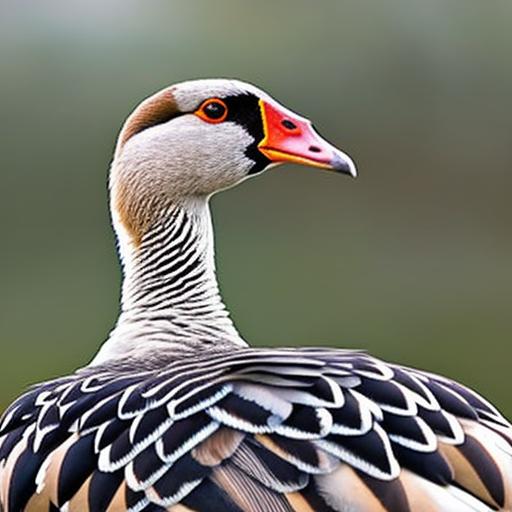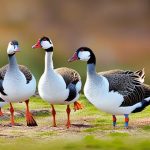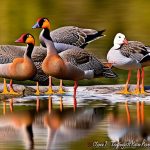Domestic geese come in a variety of breeds, each with its own unique characteristics and traits. Some of the most popular breeds include the Toulouse, Embden, Chinese, and African. The Toulouse is known for its large size and gentle nature, making it a popular choice for meat production. The Embden, on the other hand, is prized for its white feathers and excellent egg-laying abilities. The Chinese breed is known for its distinctive knob at the base of its bill, while the African breed is valued for its ability to thrive in hot climates.
When choosing a breed of domestic geese, it’s important to consider your specific needs and goals. If you’re looking for a breed that is well-suited for meat production, then the Toulouse or Embden may be the best choice for you. On the other hand, if you’re interested in egg production, then the Chinese or African breed may be more suitable. Additionally, it’s important to consider the climate and environment in which the geese will be raised, as some breeds are better suited for certain conditions than others. By understanding the different breeds of domestic geese and their unique characteristics, you can make an informed decision when choosing the right breed for your farm or homestead.
Choosing the Right Housing for Your Geese
When it comes to housing domestic geese, there are a few key factors to consider. First and foremost, it’s important to provide your geese with a safe and secure shelter that protects them from predators and the elements. This can be achieved through the use of a sturdy coop or barn, as well as fencing to create a secure outdoor space for the geese to roam. Additionally, it’s important to provide ample space for the geese to move around and exercise, as well as access to fresh water for drinking and bathing.
In addition to providing a safe and secure shelter, it’s also important to consider the specific needs of the geese when designing their housing. For example, geese are known for their love of water, so providing a pond or access to a water source for swimming and bathing is essential. Additionally, geese are social animals and thrive in the company of others, so it’s important to provide enough space for a small flock to live together comfortably. By taking these factors into consideration, you can ensure that your geese have a safe, comfortable, and enjoyable living environment.
Feeding and Nutrition for Domestic Geese
Feeding and nutrition are crucial aspects of caring for domestic geese. Geese are herbivores and primarily feed on grass, weeds, and other vegetation, making them well-suited for grazing in a pasture or open field. In addition to their natural diet, geese can also be supplemented with commercial poultry feed to ensure that they receive all the necessary nutrients for optimal health and growth. It’s important to provide a balanced diet that includes a mix of grains, greens, and protein to support the geese’s overall health and well-being.
In addition to their regular diet, it’s important to provide access to fresh, clean water at all times. Geese require water not only for drinking, but also for bathing and grooming. Providing a pond or access to a water source for swimming and bathing is essential for the overall health and happiness of the geese. Additionally, it’s important to monitor the geese’s diet and adjust their feeding regimen as needed, especially during different stages of growth, egg-laying, or molting. By providing a balanced diet and access to fresh water, you can ensure that your geese are healthy and thriving.
Health and Veterinary Care for Geese
Maintaining the health and well-being of domestic geese is essential for their overall welfare and productivity. Regular veterinary care and preventative measures are important for keeping geese healthy and free from disease. It’s important to work with a veterinarian who is knowledgeable about geese and can provide guidance on proper care and treatment. Additionally, it’s important to monitor the geese for any signs of illness or injury and seek veterinary care as needed.
In addition to regular veterinary care, there are several preventative measures that can be taken to keep geese healthy. This includes providing a clean and sanitary living environment, as well as regular cleaning and maintenance of their housing and water sources. Additionally, it’s important to practice good biosecurity measures to prevent the spread of disease, such as limiting contact with wild birds and other animals. By taking these preventative measures and seeking regular veterinary care, you can ensure that your geese are healthy and thriving.
Breeding and Reproduction of Domestic Geese
Breeding and reproduction are important aspects of raising domestic geese, whether for meat, eggs, or as pets. Geese are typically monogamous and will form strong pair bonds with a mate. Breeding season for geese typically occurs in the spring, with females laying a clutch of eggs and incubating them for around 28-30 days. It’s important to provide a safe and comfortable nesting area for the female goose to lay and incubate her eggs, as well as to protect the eggs from predators and the elements.
Once the goslings hatch, it’s important to provide them with a warm and safe environment to grow and develop. This can be achieved through the use of a brooder or heat lamp to provide warmth, as well as access to food and water. It’s important to monitor the goslings closely and provide any necessary care or treatment to ensure that they are healthy and thriving. By understanding the breeding and reproduction process of domestic geese, you can successfully raise and care for goslings on your farm or homestead.
Training and Handling Your Geese
Training and handling domestic geese is an important aspect of their care, especially if they will be used for working purposes or as pets. Geese are intelligent and social animals that can be trained to follow commands and perform certain tasks. Training can be achieved through positive reinforcement and repetition, as well as by establishing a strong bond and trust with the geese. It’s important to be patient and consistent when training geese, as they respond well to routine and structure.
In addition to training, it’s important to handle geese regularly to ensure that they are comfortable and well-socialized. This can be achieved through gentle handling and interaction with the geese on a regular basis. By establishing a strong bond and trust with the geese, you can ensure that they are well-behaved and responsive to commands. Additionally, it’s important to provide a safe and comfortable environment for the geese to live and interact with humans. By training and handling your geese with care and patience, you can ensure that they are well-behaved and responsive to your commands.
Geese Behavior and Socialization
Understanding the behavior and socialization of domestic geese is important for their overall welfare and well-being. Geese are social animals that thrive in the company of others and form strong bonds with their flock mates. It’s important to provide a safe and comfortable environment for the geese to live and interact with one another, as well as with humans. Additionally, it’s important to monitor the behavior of the geese and address any signs of aggression or stress.
In addition to their social nature, geese are also known for their protective instincts and can be used as effective guard animals. Geese are naturally territorial and will alert their flock to the presence of strangers or potential threats. By understanding the behavior and socialization of geese, you can ensure that they are well-adjusted and thriving in their environment. Additionally, it’s important to provide ample space for the geese to move around and exercise, as well as access to fresh water for drinking and bathing. By understanding the behavior and socialization of domestic geese, you can ensure that they are happy and healthy.
Protecting Your Geese from Predators
Protecting domestic geese from predators is an important aspect of their care, especially if they are allowed to roam freely in a pasture or open field. Geese are natural prey animals and are vulnerable to attacks from predators such as foxes, coyotes, and birds of prey. It’s important to take preventative measures to protect the geese from predators, such as by providing a secure and sturdy coop or barn for them to roost in at night. Additionally, it’s important to use fencing to create a secure outdoor space for the geese to roam during the day.
In addition to providing a secure living environment, it’s important to be vigilant and monitor the area for signs of potential predators. This can include checking for tracks or other signs of activity, as well as using deterrents such as motion-activated lights or sound devices. By taking these preventative measures and being vigilant, you can protect your geese from potential predators and ensure their safety and well-being.
Geese in the Garden: Using Geese for Pest Control
Geese can be valuable allies in the garden, as they are natural grazers and can help control weeds and pests. By allowing geese to graze in the garden, they can help keep the area clear of unwanted vegetation and insects. Additionally, geese can be used to control pests such as slugs and snails, which can be damaging to plants. By allowing geese to roam in the garden, they can help keep the area clean and free from pests, while also providing natural fertilizer through their droppings.
In addition to their pest control abilities, geese can also be used to help maintain the garden by aerating the soil and spreading seeds. By allowing geese to graze in the garden, they can help loosen the soil with their beaks and feet, which can improve drainage and promote healthy plant growth. Additionally, geese can help spread seeds by consuming and dispersing them throughout the garden. By using geese for pest control and garden maintenance, you can harness their natural abilities to help keep your garden healthy and thriving.
Selling Geese and Their Products: A Guide for Small-Scale Farmers
For small-scale farmers, selling geese and their products can be a valuable source of income and a way to share the benefits of raising geese with others. Geese can be sold for meat, eggs, or as pets, depending on the specific breed and purpose. Additionally, geese products such as feathers, down, and manure can also be sold for additional income. When selling geese and their products, it’s important to consider the specific market and demand for these items, as well as any legal requirements or regulations.
In addition to selling geese and their products, small-scale farmers can also offer educational opportunities such as farm tours or workshops to share their knowledge and experience with others. This can help raise awareness about the benefits of raising geese and provide an additional source of income. Additionally, small-scale farmers can also consider value-added products such as goose meat products or crafts made from goose feathers or down. By selling geese and their products, small-scale farmers can share the benefits of raising geese with others and generate income for their farm or homestead.
Meet Walter, the feathered-friend fanatic of Florida! Nestled in the sunshine state, Walter struts through life with his feathered companions, clucking his way to happiness. With a coop that’s fancier than a five-star hotel, he’s the Don Juan of the chicken world. When he’s not teaching his hens to do the cha-cha, you’ll find him in a heated debate with his prized rooster, Sir Clucks-a-Lot. Walter’s poultry passion is no yolk; he’s the sunny-side-up guy you never knew you needed in your flock of friends!







